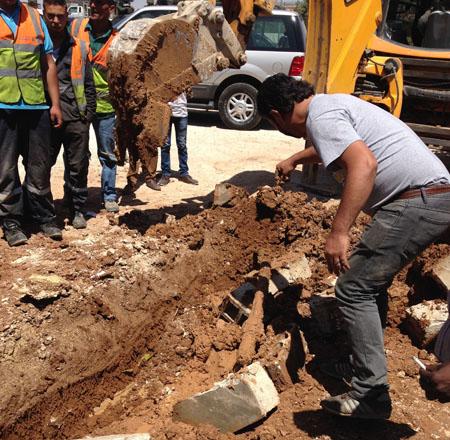AMMAN — Seventy per cent of water loss in Jordan is due to theft and illegal usage, according to the Ministry of Water and Irrigation.
Since the ministry launched a crackdown on water violations in August last year, and up until December, more than 7,091 illegal water pipes were dismantled, of which 75.5 per cent were in the capital, according to the ministry’s figures.
The ministry registered 1,919 violations on main water conveyors and 3,360 cases of changing water gauges in Amman alone between August and December last year.
In Irbid, the ministry’s teams registered 1,163 violations during the same period, 95 in Ajloun Governorate, 35 in Jerash and over 150 in Mafraq and Northern Badia.
“In addition, a total of 174 illegal wells were sealed in different parts of the country, while 12 water drillers were confiscated for digging wells without obtaining a licence. Last year, the ministry referred 97 cases to court,” Water Minister Hazem Nasser said in a statement e-mailed to The Jordan Times.
The minister said legal measures were taken to start addressing water violations in court as economic crimes, revealing plans for establishing a specialised court to address water-related crimes.
The Cabinet, which earlier this month gave the ministry jurisdiction to strictly end all forms of violations on water resources, has endorsed several decisions and regulations to curb infringements and maximise penalties against offenders, according to Nasser.
These include depriving owners of illegal wells of agricultural or any other governmental loans, and supplying electricity for wells only after clearance is obtained from the Water Authority of Jordan (WAJ) proving that they are licensed.
The new regulations also prohibit the import of water pumps for wells unless the Ministry of Water and Irrigation grants permission.
In addition, they entail revoking work permits of guest workers employed at farms with illegal wells.
The Cabinet also decided to raise the tariffs of water generated from illegal wells, according to the ministry statement, which indicated that wells pumping up to 10,000 cubic metres will be charged JD0.15 per cubic metre, wells pumping 10,000-30,000 cubic metres will be charged JD0.25 per cubic metre and those pumping above 30,000 cubic metres will be charged JD0.50 per cubic metre.
Nasser said that owners of illegal wells have a grace period until the end of November this year to rectify their status, otherwise, WAJ will appropriate a dunum of land surrounding the illegal well.
Water Ministry Spokesperson Omar Salameh told The Jordan Times that the ministry is pressing ahead with its campaign to end violations on the water network, calling on the public to cooperate with authorities and report violations.
The ministry banned the drilling of water wells in 1997 to limit random pumping of water and preserve aquifers from depletion and salinity.
There are 1,318 wells across the country, more than 400 of which are unlicensed or illegal, according to ministry figures.
Under Article 30 of the WAJ Law, violators are fined up to JD5,000 and jailed for two years, while Article 456 of the Penal Code stipulates that violators of water networks face three- to six-month prison terms and fines ranging between JD100 and JD1,000.

















